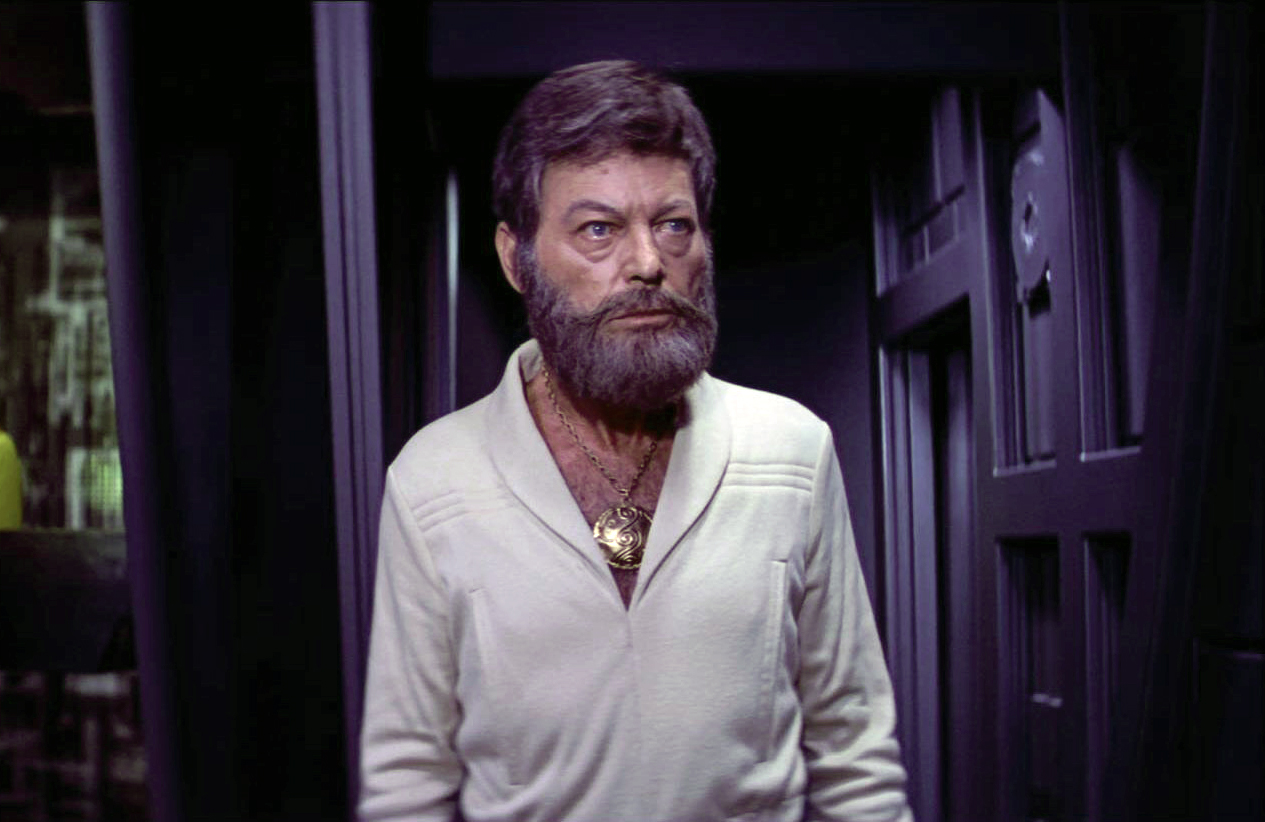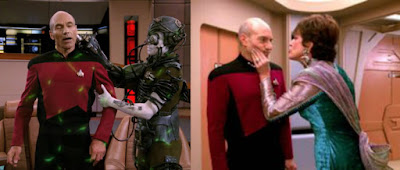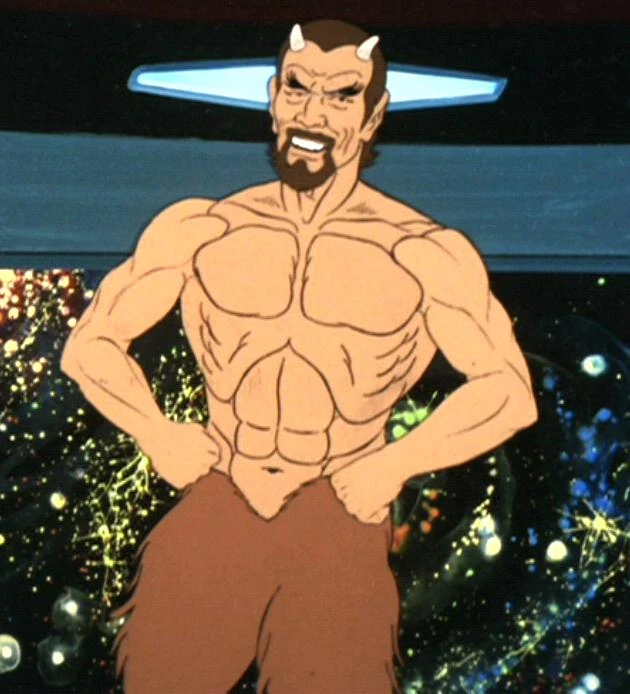Star Trek: The Motion Picture
My understanding was that the odd numbered movies were the bad ones. I’ve heard this common nerd knowledge repeated many a time among my circle of friends. So I had low expectations for this movie.
I was pleasantly surprised.
 |
| That beard is actually attached to his chest. |
Now, first, I’ll confess that someone who watches
Star Trek: The Motion Picture without first sitting through
Star Trek: The Original Series and
Star Trek: The Animated Series might not be so favorably disposed. I spent the last year plus watching every single one of those 105 episodes, so the high production values of
ST: tMP blew me away. Classy neutral Federation uniforms? Check. Wildly attractive slightly alien woman to fuel the wet dreams of the predominantly male fan base? Check. Lots of long, loving, lingering shots of the docked Enterprise? Check. This movie cemented the precedents for many Star Trek movie traditions that persist even now.
Shatner toned down the worst of his overacting tendencies, and there’s no love interest for him in this movie. His plot line centers around his drawn out pissing match with the Enterprise’s new commander and candidate for the Herrenrasse, Captain Decker. (Every Federation commander we’ve encountered to date looks like a 1950’s football captain, even in the cartoon.)
 |
| Rand-om cameo. |
The plot of the movie is solid, even if littered with “alien” sex appeal vehicle Lt. Ilia in a long sleeved bathrobe so short, a stiff breeze aboard the Enterprise would’ve made this movie unsuitable for anyone under the age of 17.
Favorite moments: Bones, called out of retirement, showing up to the Enterprise in a deep V with a beard that any PNW hipster could wear with pride - AND - Janice Rand making a cameo in the early part of the movie! I didn’t forget you, Yeoman Janice. Welcome to the future. I s’pose the basketweave fez hairdo is no longer popular in the Federation twenty years later.
Star Trek II: The Wrath of Khan
This movie had the largest opening weekend to date when it was released in 1982. In general, people seemed to like it better than
ST:tMP, though to my eyes they seem equally good movies.
I do appreciate that this movie deals heavily with Kirk coming to grips with his own aging. Early on, Kirk gets a pair of eye glasses from Bones as a birthday gift, along with a bottle of Romulan ale that I’m certain is blue raspberry Kool-Aid. For a laugh, check out Kirk’s interior decorating scheme:
 |
| The prime directive meets the second amendment. |
This movie does have its genuinely scary moments. When Chekov and his expendable pal happen upon Khan (played by Ricardo Montablan, reprising his role from the
Star Trek: The Original Series) and his fellow augments, there’s a skin-crawling scene in which space brain parasites burrow into their ears and make them into plot-enabling double agents for Khan, whose pectoral muscles are reportedly real, but seriously, where are his nipples? In his armpits?
 |
| Nipples were considered genetic imperfections. |
This movie introduces Kirk’s ex-lover, a scientist named Carol Marcus, and his son, a hothead named David who looks and acts a lot like his dad. And then there’s Saavik, a Vulcan Federation cadet with a lot to prove, played by a pre-Cheers Kirstie Alley. There’s a lot going on.
The thing I find so frustrating about this movie is how flawed and boring Khan is. He is genetically engineered to be the perfect enemy, and yet he’s so annoyingly and predictably stupid in his revenge fixation. Plus, Ricardo Montablan is the only person in the movie who can out-overact Shatner. I’ve been saying “It is very cold in spaaaace” for weeks now.
The movie ends with a truly moving bromance goodbye for Kirk and Spock. It’s worth a watch, if you’re on the fence, but bring the popcorn.
Star Trek III: The Search for Spock
This one is poorly written, much too long, and travels the spectrum between boring and shabby. I think a fan edit is in order.
 |
| Oh, my. |
Broad strokes: Spock put his spirit into McCoy’s body before he died, so the crew has to find Spock’s body and bring it on to Vulcan where his brain swap can be undone. Along the way Kirk’s son gets murdered, because we can’t have a hot young son of Kirk running around the Federation and competing with Shatner for babes.
Don’t even get me started on Christopher Lloyd’s bumbling and caricaturish Klingon villain.
Bright spots: First on-screen Targ! Sulu, Uhura, Scott and Chekov all get to shine as they steal the Enterprise for Mission: Save Spock. And we get to see Sulu’s sweet-ass leather cape!
Sidenote: Vulcan sex is super boring and seems to comprise of lightly touching each other’s fingers. We finally get to see a young Spock en flagrante and that’s it?
Star Trek IV: The Voyage Home
If you’re looking for a Star Trek movie with the original cast that’s a fun, widely accessible scifi flick, here’s a great choice. This film, like
Star Trek III: The Search for Spock, was directed by Leonard Nimoy. A hulking probe shows up at Earth and starts broadcasting humpback whalesong. The problem? All the Earth whales died centuries ago.
So of course Kirk and Spock logically derive that they need to go back in time and pick up some whales. So they slingshot around the sun to achieve this. Spock just rustles up the math on how to do it in his head, ‘cause Spock.
The entertainment value comes from seeing The Original Series crew playing around in 1986. Watching Chekov ask a cop in San Francisco for directions to the “nuclear wessels” is just good fun. And then there’s Kirk and Spock trying out 20th century cursing. Double dumb ass on you.
 |
| Contractually obligated romance at its best. |
There’s a love interest for Kirk in this movie: a marine biologist named Dr. Gillian Taylor who’s 21 years younger than Kirk, and it shows. Turns out the part was initially promised to Eddie Murphy, a fan of the franchise whose star was rising. But there were concerns on both sides of that arrangement: Murphy wanted to play an alien, not a marine biology professor, and the Star Trek muckety mucks worried that Murphy would expose their franchise to ridicule. Thankfully, Shatner solved the problem by insisting that Kirk must have a love interest in this movie, since Kirk had suffered under a three-movie dry-spell. Enter Catherine Hicks’s 80’stastic lady mullet.
Kirk had lots of demands for this movie, beyond onscreen lust targets. He also demanded a bigger paycheck ($2.5 million) and the privilege of directing the next movie. I’m sure there’s a little “if Nimoy can do it, I can do it better” at work there. The frenemy status between Shatner and Nimoy deserves its own blog post.
I’m sure I won’t shatter anyone’s expectations when I say that the captain and crew of the Enterprise save the day, and alter the future by bringing some whales back with them. Huzzah, cue credits.
(But seriously, those whales most assuredly died after traveling 300 years into the future. The ocean salinity in 2286 is different, and oceans in which humpback whales have been long absent probably have an insufficient food chain. I give those whales a few weeks to live in 2286, tops.)















